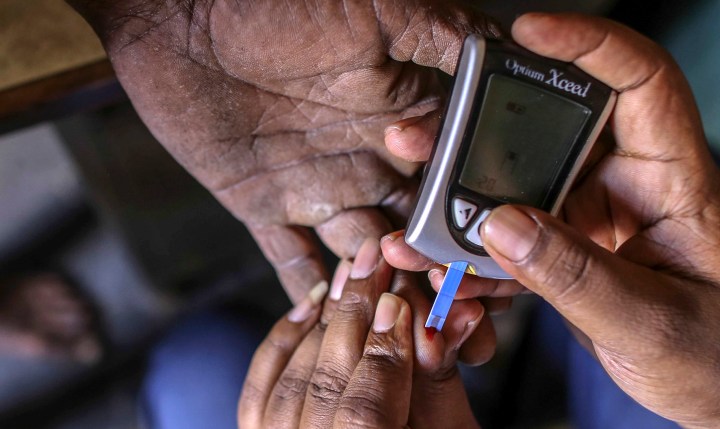Spotlight
Deceased: 42% of Covid-positive diabetics admitted to Western Cape hospitals

Roughly 42% of people with diabetes who tested positive for Covid-19 and had to be admitted to hospital in the Western Cape had died as of 16 July. The preliminary data, presented during a recent digital press conference of the Western Cape Department of Health, is in line with reports from countries hardest hit by the pandemic.
Even before the Covid-19 pandemic diabetes was recognised to be one of the leading causes of illness and death worldwide. According to a recent article penned by leading experts in internal medicine, endocrinology and metabolism and published in the South African Medical Journal (SAMJ), diabetes and obesity globally accounted for “43.4% of all deaths in 2012, compared with 33.6% of deaths from HIV/Aids and TB combined”.
“In SA, high body mass indexes (BMIs) and DM [diabetes] are the second and third leading risk factors for early death and disability, respectively, and the increasing overlap with infectious diseases is a growing concern,” the authors wrote.
While it is known that diabetes claims many lives, not that much is known about how many people in South Africa have the disease. “Accurate current data on the prevalence of diabetes in South Africa is quite difficult to find as there are no recent robust studies in all provinces in South Africa,” says Professor Joel Dave, head of endocrinology at the University of Cape Town and co-author of the SAMJ article.
Dave points out that, while there are estimates, there is also significant uncertainty over how many people have uncontrolled diabetes. The Western Cape’s 2019 Burden of Disease Report estimated that around 70% of people with diabetes in the province had poorly controlled or uncontrolled diabetes.
Diabetes and Covid-19
In another WC digital press conference, Dave revealed that 42% of people with diabetes who were hospitalised for Covid-19 in the Western Cape had died as of 16 July.
This does not mean people with diabetes are at higher risk of contracting Covid-19, but rather that once they do contract the disease they are at higher risk of serious illness or death.
In an earlier digital press conference, Prof Mary-Ann Davies from UCT indicated that 52 out of every 100 Covid-19 deaths in the Western Cape were in people with diabetes. (See the relevant comorbidity report for the province here.)
In trying to explain the reason for the increased risk in the press conference, Dave referred to a study that found that in Covid-19 patients with hyperglycaemia (raised blood sugar levels) there is increased expression of the ACE2 receptor. It is through the ACE2 receptor that SARS-CoV-2 (the virus that causes Covid-19) gains access to cells, particularly the heart and kidneys.
Altered immune systems are also thought to play a role.
“In diabetics, they have a completely dysregulated immune system. Such that they have a much greater risk of developing what has been labelled a cytokine storm, a release of a whole lot of inflammatory mediators, that ultimately leads to multi organ dysfunction,” Dave explains.
He says available data show “this is happening in patients with mainly Type 2 Diabetes, who are mainly at an increased age, they are usually overweight or obese and often they have pre-existing vascular disease or pre-existing kidney disease”. “All of these factors in their own right have shown to lead to more severe Covid-19,” Dave says.
Concerns over uncontrolled diabetes
Spotlight asked Prof Naomi (Dinky) Levitt, director of the Chronic Disease Initiative for Africa, why so many people living with diabetes are at risk of dying from Covid-19.
One reason, says Levitt, is poorly controlled diabetes, which means poor blood sugar control.
Poor blood sugar control, also referred to as poor glycaemic control, means the blood sugar levels of a patient are not within normal range (either too high or too low).
According to the 2017 report of Society for Endocrinology, Metabolism and Diabetes of South Africa (SEMSA) the normal range for blood sugar levels for diabetes patients, which is measured as HbA1c (glycated haemoglobin) can vary according to the individual patient.
However, the general target for blood glucose levels should be 7% or below.
“We know that poor glycaemic control based on international literature is associated with poorer outcomes (in Covid-19 patients),” says Levitt. This not only poses a risk when it comes to Covid-19, but also other infections.
“Poorly controlled diabetes is associated with an increased risk of all infection… It’s like honey, and bugs love honey,” she says.
Levitt explains that there are a variety of factors involved in blood sugar control, both within the individual and his or her circumstances and within the health system and society at large.
She says that the patient’s relationship with the health system can contribute to how well they manage their blood glucose levels. For example, how they are treated by health professionals, and whether their medication is available when they have to collect it, can all have an impact.
“It’s extremely complex… You can’t blame the patient… You do not know whether it lies at the individual or at the system or at the society,” says Levitt.
Margot McCumisky, the National Director of Diabetes SA, says that one reason for poor blood sugar control is that blood sugar levels tend to fluctuate throughout the day for various reasons. These include diet, certain medications, stress, temperature changes, and not eating enough before exercise.
“It is one of the hardest (diseases) to manage and people are (often) just not provided with ways to control it, education-wise or with tools,” she adds.
Waiting too long
One reason for the poor outcomes of Covid-19 patients living with diabetes in the Western Cape is that people often only go to hospital once they are already very seriously ill.
“The early data (from the Western Cape) shows that people (with diabetes who get Covid-19) who got admitted to hospital and died, died within a very short time of admission. The assumption being that they waited very long,” says Levitt.
Levitt explains that waiting too long to get help when you have Covid-19 makes it harder for interventions to be effective.
“If you present late, the opportunity for intervention that is going to be meaningful is going to be limited,” she says. “Whereas, if you get admitted earlier in the disease process, the chances of intervening are going to be very much greater.”
A Diabetes Action Plan for the Western Cape
In response to the increased risk that Covid-19 poses for people living with diabetes, the Western Cape’s Department of Health recently launched an action plan aimed at reducing the number of poor outcomes among people with diabetes.
Explaining the steps of the plan in an earlier press release, the department said it “takes a focused, risk stratified approach towards enabling early testing for Covid-19. Essentially, this means that the department phones people living with diabetes to check if they have Covid-19 symptoms, if their blood sugar levels are under control and where necessary, offer early admission to hospital. offer early admission to hospital.
In a digital press conference on the 29th of July, the Western Cape Health’s Head of Department Dr Keith Cloete reveals the early results of the action plan. He says that since the strategy had been announced and implemented two weeks before, 152 patients had been contacted.
He adds that of those contacted, 63 diabetic patients have been admitted to hospital.
Departmental spokesperson Mark van der Heever confirmed this and adds that: “Out of the 63, three of the admitted patients have died, 40 of the admitted patients have been discharged and the remaining 20 patients are not in clinical distress.”
What can people living with diabetes do to protect themselves?
According to McCumisky, being able to do something proactive can help manage the anxiety that people living with diabetes might be feeling. She advises that if people are not doing so already, they should start monitoring their blood sugar levels and make notes of the readings.
“Make notes, record your blood glucose levels, (and) anything unusual. That is the kind of thing that will help your doctor,” she says. “Get exercise regularly, even if it [is] just walking 10 or 15 minutes a day in the fresh air. Manage your diet as best you can… And educate yourself (about diabetes).” DM/MC
This article was produced by Spotlight – health journalism in the public interest. Sign up for our newsletter.
"Information pertaining to Covid-19, vaccines, how to control the spread of the virus and potential treatments is ever-changing. Under the South African Disaster Management Act Regulation 11(5)(c) it is prohibited to publish information through any medium with the intention to deceive people on government measures to address COVID-19. We are therefore disabling the comment section on this article in order to protect both the commenting member and ourselves from potential liability. Should you have additional information that you think we should know, please email [email protected]"



 Become an Insider
Become an Insider